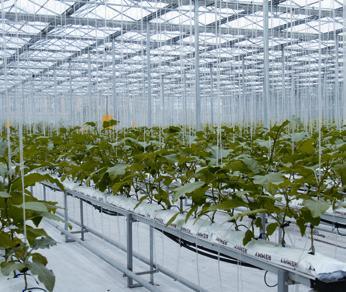Hotbed of Innovation
2020-02-17ByWangHairong
By Wang Hairong

Despite grass-withering outdoor temperature in January, vegetable seedlings in a greenhouse in the Shanxi Agricultural Valley are flourishing, fi lling the place with spring-like vitality.
The plants are nourished with nutrients and water from a smart integrated drip irrigation and fertilizing equipment. The system can be operated via mobile phones or computers, said Zhang Xiuhua, Director of the General Offi ce of the Shanxi Nonggu Biotechnology Research Institute. It is the fifth-generation such equipment developed by the institute.
It collects data on temperature, humidity of soil and air, as well as light intensity through sensors placed in the greenhouse, and transmits them to a control platform so that operators can manage the greenhouse remotely.
The institute is one of the many start-ups that have been founded in the Shanxi Agricultural Valley, named after the Silicon Valley. Located in Jinzhong in Shanxi Province in north China, the valley was launched in 2017 under a provincial strategy to boost innovation-driven agriculture. Recently, it has been upgraded into a national agricultural hi-tech industry demonstration zone (ATZ) to pioneer agricultural science and technology innovations and pilot agricultural supply-side reform.
The first two national-level ATZs were approved for Jinzhong and Nanjing in Jiangsu Province, east China, in November 2019.
Focusing on dry farming
Lying on the Loess Plateau in central Shanxi, Jinzhong is a cradle of Chinas agrarian civilization. In the 1960s, a village there, Dazhai, was a national agricultural model.
The 106-square-km ATZ will mainly feature organic dry farming technology and agricultural food processing, said Lan Yujie, Director of the Department of Science and Technology for Rural Development, Ministry of Science and Technology, at a press conference in Beijing in December 2019.
The zone is planned to have an output value of 36 billion yuan ($5.2 billion) by 2023, with 70 percent of it coming from agricultural hi-tech industries. By that time, it will be home to 10 national-level research institutes and 40 hi-tech enterprises.
Dry farming is usually practiced in arid areas without irrigation. Organic dry farming is important for the sustainable development of agriculture in north China. Seventy percent of the farmland in Shanxi is arid. The dry weather and limited water resources make it very difficult to expand irrigated land. So it is imperative to adopt dry farming techniques, Zhao Jianping, a top leader of Jinzhong, said at the press conference.
The technique has benefi ted the Shanxi Tiansen Vegetable and Fruit Planting Base in the Agricultural Valley. Chang Jinli, a technical supervisor at the base, told the press that a smart fertigation system has reduced water consumption by one third and doubled the per unit yield in the base. Moreover, it saves labor. Only 30 employees are needed to manage 10.48 hectares.
Stepping up innovation
After the Central Government approved the establishment of the ATZ, a team was set up under Zhao to coordinate the work. To spur the development of advanced agricultural technology, the city is seeking collaboration with universities, research institutes and enterprises.
Zhao visited the Shanxi Agricultural Valley and the Crop Ecology and Dry Cultivation Physiology Key Laboratory of Shanxi Agricultural University on January 3, suggesting they share resources. The government will support the commercialization of joint research outcomes, and the university will work with various departments in Jinzhong to establish nationallevel agricultural testing centers, he said.
He also said the local government is seeking international cooperation to build the Agricultural Valley by introducing high-yield corn varieties from Mexico and advanced farming techniques from countries such as Spain, the United Kingdom and Ukraine. Agricultural equipment and facilities would be upgraded and agricultural standardization and automation enhanced.
The city has released policies to attract outstanding researchers and entrepreneurs, offering research funding and perks such as housing subsidies.
Agricultural biologist Shang Yongjin joined the Shanxi Juxin Weiye Agricultural Technology Development Co. Ltd., a flagship company in the valley, in 2017 and currently leads its research in detoxification, plant tissue culture, virus testing and genetic engineering breeding.
The company is partnering with the academic community including China Agricultural University, the Institute of Vegetables and Flowers of the Chinese Academy of Agricultural Sciences, and Shanxi Agricultural University for scientific and technological innovation. It has developed more than 10 new strawberry varieties with independent intellectual property rights and more than 30 new vegetable varieties.

